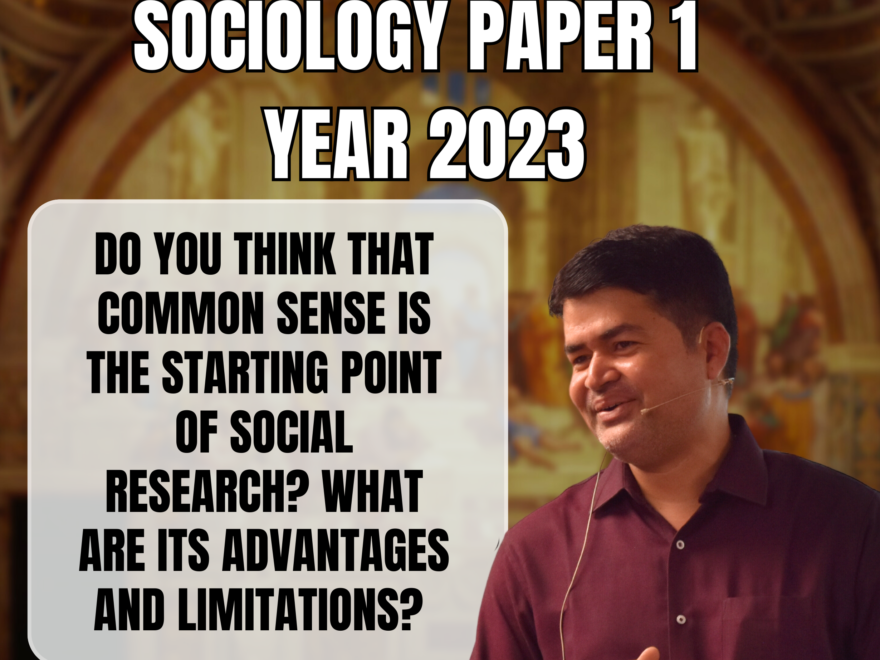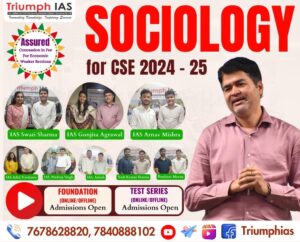Do you think that common sense is the starting point of social research What are its advantages and limitations ? Explain.
Section: A.
Sociology Paper 2023 Analysis.
Relevant for Paper 1: Unit 1 Sociology- The Discipline: Sociology and Common Sense
Question 4 (a): Do you think that common sense is the starting point of social research What are its advantages and limitations.
(20 Marks)
|
Introduction: Common Sense Definition and Brief about Starting Point of Research. Main Body: Explain role of Common Sense as Starting Point in Research as a tool from Viewpoint of Grounded Theory, Phenomenologists, Structuration Theory etc. then Advantage and Limitations of Common Sense in Social Research. Conclusion: Balanced Approach that Combines Common Sense with Scientific Methods is Crucial in Social Research. |
Introduction:
- Common sense, often defined as practical wisdom or sound judgment, is a fundamental aspect of human cognition. It is the knowledge and beliefs that are widely held and considered self-evident within a particular culture or society.
- Common sense is a potential starting point for social research, as it provides a foundation for understanding and interpreting social phenomena. In social research, common sense can serve as an initial point of reference, providing a basic understanding of human behaviour and societal phenomena.
Main body:
Common Sense as a starting point in Social Research:
- The use of common sense can lead to the development of grounded theory in social research, where theories are built from the ground up, based on observations and experiences.
- Common sense can provide practical solutions to social issues. For example, Robert K. Merton’s ‘Middle Range Theory’ which is based on observable facts and common sense, aids in solving real-world problems.
- Symbolic interactionists, such as George Herbert Mead and Erving Goffman, place a strong emphasis on common sense in their research. They study how people create and interpret symbols and meanings in their everyday interactions. Common sense is central to their approach as it underpins the shared symbols and gestures people use to communicate.
- Phenomenologists like Alfred Schutz and Edmund Husserl believe that common sense is valuable as it forms the everyday, lived experiences of individuals. They argue that understanding the subjective meanings and interpretations of individuals is crucial for in-depth social research. Common sense can serve as a starting point for exploring these meanings.
- Similarly Giddens, in his structuration theory, acknowledges the role of common sense in social life. He argues that common sense is essential for individuals to navigate the complexities of their social world. It helps people make practical, everyday decisions and interpret their social contexts.
Advantage of Common Sense in Social Research
- Easy Comprehension: The use of common sense in social research makes the findings more relatable and easier to understand for the general public. For example, Max Weber’s concept of ‘verstehen’ or interpretive understanding, which is rooted in common sense, helps in comprehending social action.
- Initial Hypothesis Formation: According to John Madge every scientific enquiry starts with common sense knowledge. Common sense can help in forming initial hypotheses or assumptions in social research. For instance, Emile Durkheim’s study of suicide rates was initially based on the common-sense notion that social integration influences suicidal tendencies.
- Ethnographic Insights: Ethnographers often rely on common sense to understand the social and cultural dynamics of a community, as Clifford Geertz’s interpretive approach in anthropology suggests.
- Accessibility: Common sense is readily available to researchers and can serve as a convenient starting point.
Limitations of Common Sense in Social Research
- Subjectivity: Common sense is subjective and varies from person to person. What may seem like common sense to one person may not be the same for another. This subjectivity can lead to biases in social research. According to Emile Durkheim common sense was deceptive, unrealistic, untestified and speculative.
- Lack of Empirical Evidence: Common sense often lacks empirical evidence and is based on personal beliefs and experiences. This can lead to inaccurate conclusions in social research.
- Oversimplification: Common sense can lead to oversimplification of complex social phenomena, obscuring the underlying dynamics and structures.
- Resistant to Change: Common sense is often resistant to change and can hinder the development of new theories and concepts in social research.
- Culturally relative: for instance what is considered common sense in one culture may not be the same in another. This cultural relativism can limit the applicability of common sense in cross-cultural social research.
- Localised knowledge : Andre Beteille says that Sociological knowledge tends to be general, if not universal; on the other hand common sense knowledge is particular and localized.
- Max Weber, a prominent sociologist, cautioned against relying solely on common sense in social research. He argued that common sense might be based on subjective, personal experiences and values, making it unreliable for scientific investigation. He emphasized the importance of value neutrality and systematic inquiry to ensure objectivity in social.
Conclusion:
While common sense can provide a starting point in social research, it is essential to move beyond it to gain a more accurate and comprehensive understanding of social phenomena. Sociologists like Pierre Bourdieu have emphasised the importance of scientific objectivity in social research, which goes beyond common sense. Therefore, a balanced approach that combines common sense with scientific methods is crucial in social research.
Related Blogs…
To master these intricacies and fare well in the Sociology Optional Syllabus, aspiring sociologists might benefit from guidance by the Best Sociology Optional Teacher and participation in the Best Sociology Optional Coaching. These avenues provide comprehensive assistance, ensuring a solid understanding of sociology’s diverse methodologies and techniques.
META TAGS:
Iron Law of Oligarchy, Robert Michels, Vilfredo Pareto, Lions and Foxes theory, power dynamics, organizational oligarchy, elite circulation, political sociology, leadership styles, organizational control, sociological theories, political maneuvering, elite differentiation, power concentration, societal stability, political leadership, strategic political leadership, Sociology Question Paper, Sociology Question Paper 2023, Sociology Question Paper CYQ, Sociology Question Paper UPSC, What, according to Robert Michels, is the iron law of oligarchy? Do lions and foxes in Vilfredo Pareto’s theory, essentially differ from each other? Substantiate.
Why Vikash Ranjan’s Classes for Sociology?
Proper guidance and assistance are required to learn the skill of interlinking current happenings with the conventional topics. VIKASH RANJAN SIR at TRIUMPH IAS guides students according to the Recent Trends of UPSC, making him the Best Sociology Teacher for Sociology Optional UPSC.
At Triumph IAS, the Best Sociology Optional Coaching platform, we not only provide the best study material and applied classes for Sociology for IAS but also conduct regular assignments and class tests to assess candidates’ writing skills and understanding of the subject.
Choose The Best Sociology Optional Teacher for IAS Preparation?
At the beginning of the journey for Civil Services Examination preparation, many students face a pivotal decision – selecting their optional subject. Questions such as “which optional subject is the best?” and “which optional subject is the most scoring?” frequently come to mind. Choosing the right optional subject, like choosing the best sociology optional teacher, is a subjective yet vital step that requires a thoughtful decision based on facts. A misstep in this crucial decision can indeed prove disastrous.
Ever since the exam pattern was revamped in 2013, the UPSC has eliminated the need for a second optional subject. Now, candidates have to choose only one optional subject for the UPSC Mains, which has two papers of 250 marks each. One of the compelling choices for many has been the sociology optional. However, it’s strongly advised to decide on your optional subject for mains well ahead of time to get sufficient time to complete the syllabus. After all, most students score similarly in General Studies Papers; it’s the score in the optional subject & essay that contributes significantly to the final selection.
“A sound strategy does not rely solely on the popular
Opinion of toppers or famous YouTubers cum teachers.”
It requires understanding one’s ability, interest, and the relevance of the subject, not just for the exam but also for life in general. Hence, when selecting the best sociology teacher, one must consider the usefulness of sociology optional coaching in General Studies, Essay, and Personality Test.
The choice of the optional subject should be based on objective criteria, such as the nature, scope, and size of the syllabus, uniformity and stability in the question pattern, relevance of the syllabic content in daily life in society, and the availability of study material and guidance. For example, choosing the best sociology optional coaching can ensure access to top-quality study materials and experienced teachers. Always remember, the approach of the UPSC optional subject differs from your academic studies of subjects. Therefore, before settling for sociology optional, you need to analyze the syllabus, previous years’ pattern, subject requirements (be it ideal, visionary, numerical, conceptual theoretical), and your comfort level with the subject.
This decision marks a critical point in your UPSC – CSE journey, potentially determining your success in a career in IAS/Civil Services. Therefore, it’s crucial to choose wisely, whether it’s the optional subject or the best sociology optional teacher. Always base your decision on accurate facts, and never let your emotional biases guide your choices. After all, the search for the best sociology optional coaching is about finding the perfect fit for your unique academic needs and aspirations.
Follow us :
🔎 https://www.instagram.com/triumphias
🔎 https://www.youtube.com/c/TriumphIAS
🔎 https://t.me/VikashRanjanSociology
Find More Blogs…
| Compare and contrast Karl Marx’s and Max weber’s | Karl Marx- Historical Materialism |
| Position of Women In the Modern Indian Society | Sociology: Social system and pattern variables |
KEYWORD: common sense is the starting point of social research, common sense is the starting point of social research, common sense is the starting point of social research, common sense is the starting point of social research, common sense is the starting point of social research, common sense is the starting point of social research, common sense is the starting point of social research, common sense is the starting point of social research, common sense is the starting point of social research, common sense is the starting point of social research, common sense is the starting point of social research, common sense is the starting point of social research



One comment